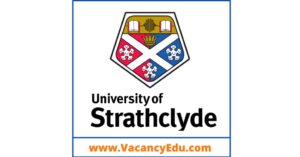University of Strathclyde, Glasgow, Scotland invites online Application for number of Fully Funded PhD Degree at various Departments. We are providing a list of Fully Funded PhD Programs available at University of Strathclyde, Glasgow, Scotland.
Eligible candidate may Apply as soon as possible.
(01) PhD Degree – Fully Funded
PhD position summary/title: Ultra-intense laser-plasma interactions: High field physics and ion acceleration in the radiation-dominated regime
Rapid developments in high power laser technology have enabled new regimes in laser intensity to be reached, which has opened up new frontiers in science via the production of extreme pressures, temperatures and intense electric and magnetic fields. With the advent of multi-petawatt-class lasers on the horizon, e.g. via the European extreme light infrastructure (ELI) project, unprecedented intensities will soon be achievable, giving rise to a new high-field physics phenomena in which large fractions of the laser energy is absorbed into gamma-rays and subsequently electron-positron pair creation. The gamma-rays are produced by synchrotron-like radiation of electrons accelerated by the laser and the resulting radiation force can dominate the motion at ultra-high intensities, making this potentially the most intense gamma-ray source in the laboratory.
In this ultra-intense regime, the radiation pressure of the laser pulse also leads to the acceleration of ions, resulting in ion beams with unique characteristics that are unattainable using existing conventional radio frequency ion accelerators. The ion source is essentially ‘point-like’ in both space (micron scale) and time (picoseconds), and the resulting ion pulse is several orders of magnitude brighter than can be achieved with conventional technology. These unique ion sources have many potential applications in science, medicine and industry.
Deadline : Open until filled
(02) PhD Degree – Fully Funded
PhD position summary/title: Hybrid Polariton-Quantum Dot Platforms for Scalable On-Chip Quantum Information Processing
Deadline : Open until filled
View All Fully Funded PhD Positions Click Here
(03) PhD Degree – Fully Funded
PhD position summary/title: 3-D nanoscale structural analysis in the scanning electron microscope through application of direct electron detectors
This joint project between The University of Strathclyde, Glasgow and the National Physical Laboratory, Teddington promises to open up a whole new research area in non-destructive three dimensional texture, strain and defect mapping in solid-state materials. Such information is invaluable for the optimisation of new materials ranging from steels for the automotive industry; to titanium based alloys for aerospace applications; to semiconductor thin films for use in the solid state lighting and electronics industries.
Deadline : Open until filled
(04) PhD Degree – Fully Funded
PhD position summary/title: Theory and simulations of frequency combs in micro-ring resonators
Frequency combs are spectra consisting of a series of discrete, equally spaced elements and form the modern standard of optical frequencies and clocks. Frequency combs led to the Nobel Prize in Physics to John Hall and Theodor Hänsch in 2005. Micro-resonator-based frequency combs have attracted a lot of attention for their potential applications in precision metrology, gas sensing, arbitrary optical waveform generation, quantum technologies, telecommunication and integrated photonic circuits. Micro-resonator combs are generated in ultra-high-Q optical resonators that enable the confinement of extremely high optical power levels in very small mode-volumes. The high optical power densities lead to the conversion of a continuous wave laser into a comb of equidistant optical modes that can be used like a ruler for optical frequency measurements.
Deadline : Open until filled
(05) PhD Degree – Fully Funded
PhD position summary/title: Super-resolution imaging of biological organisms: seeing below the classical limits
One of the key scientific challenges of the 21st century is to better understand the principles that allow a collection of neural cells to work as a fully functioning brain. The complexity of neurobiology, along with the range of possible parameters to be investigated means that new techniques are embraced and quickly incorporated.
A key aspect of the group’s research involves imaging small particles of diamond known as nanodiamond (ND). This material offers many advantages as a fluorescent label for biological applications. Its biocompatibility, potential sensitivity to electric and magnetic fields, lack of photobleaching and the possibility of targeting specific neural structures are all of particular interest to researchers in neurophysiology. By utilising Stimulated Emission Depletion (STED) microscopy, in conjunction with adaptive optics, it will be possible to image ND tens of microns into tissue with a resolution of 50nm. Achieving this resolution will allow imaging of synaptic sites, the anatomical features where signals are passed from one neuron to another, thereby allowing a better understanding of the propagation of information through the brain.
Deadline : Open until filled
Polite Follow-Up Email to Professor : When and How You should Write
Click here to know “How to write a Postdoc Job Application or Email”
(06) PhD Degree – Fully Funded
PhD position summary/title: A new super-resolution optical microscopy method for live cell imaging
A PhD position (fully funded for UK/EU students only) is available at the University of Strathclyde in the Centre for Biophotonics and the Department of Physics. The successful candidate will develop and use a new super-resolution optical microscope to obtain very high spatial resolution images of fluorescently labelled live cells.
The PhD project will focus on:
- Design and construction of the optical microscope
- Use of laser and LED sources for excitation of fluorescence
- Application of cutting-edge sensor technology for obtaining time-resolved images
- Learning specimen preparation techniques, including fluorescence labelling and cell culture
- Analysis of the data and making 3D and 4D image reconstructions of cells and tissues
- Writing papers and communicating outcomes of research at national and international conferences.
Deadline : Open until filled
(07) PhD Degree – Fully Funded
PhD position summary/title: Early Intervention Inspection of Hot-Forged Components
The manufacture of Titanium Ti64 billets by gas ingot conversion induces shrinkage, liberating gas which may cause porosity, and potentially voids. Methods of early intervention (i.e. in-process) are necessary to feedback structural integrity status thus preserving cost efficiencies by limiting exposure of virgin material to potentially flawed manufacturing processes.
There is the potential for a number of defects to arise during hot-forging. These include: laps, cold shuts, surface/sub-surface cracking, inclusions, and corrosion. Detecting abnormalities prior to the solidification stage can avoid material stresses arising due to unintended inclusions not similarly elongating with the surrounding material. Flaws within the macro-zone can result in voids and cracks which, undetected, culminate in catastrophic failure (e.g. shearing). Current non-destructive testing (NDT) methodologies include visual inspection, magnetic particle inspection (MPI), radiography and penetrant testing (PT). However, they all have limitations when considering complete coverage.
Deadline : Open until filled
(08) PhD Degree – Fully Funded
PhD position summary/title: Verifiable and efficient simulation for structural-health digital twins
The correctness and validity of simulation models for structural-health digital twins is under scrutiny in this project. We propose a paradigm shift in the way simulation models are solved numerically that allows the efficient and rigorous uncertainty propagation. The research will investigate current scalability concerns in relation to the application of these rigorous solvers in structural-health monitoring.
Deadline : Open until filled
Click here to know “How to Write an Effective Cover Letter”
(09) PhD Degree – Fully Funded
PhD position summary/title: Characterisation of Ga2O3 materials for ultraviolet optoelectronic devices
We are looking for a student to investigate the structural, chemical, and optical properties of α-Ga2O3 materials at the nanoscale. The project will build on the world-leading electron microscopy and spectroscopy capabilities of the Semiconductor Spectroscopy and Devices (SSD) group at the University of Strathclyde, which include electron probe micro-analysers (EPMAs) and low-vacuum scanning electron microscopes. The student will conduct characterisation using the following techniques: cathodoluminescence (CL), electron beam induced current (EBIC), electron channelling contrast imaging (ECCI), electron backscattered diffraction (EBSD), and energy/wavelength dispersive X-ray spectroscopy (EDX/WDX), as well as photoluminescence (PL). Throughout the project the student will also be exposed to other experimental techniques such as atomic force microscopy (AFM), X-ray diffraction (XRD), transmission electron microscopy (TEM), as well as theoretical modelling. We will work in close collaboration with the crystal growers (e.g. at the University of Liverpool) in order to build an in-depth understanding of how the growth affect the materials properties in order to deliver efficient devices for UV optoelectronics.
Deadline : Open until filled
(10) PhD Degree – Fully Funded
PhD position summary/title: Phase transitions in open quantum systems
Developing accurate simulations of quantum mechanical systems unavoidably involves taking into account coupling to the outside world. Such modelling is important for a wide range of physical systems, whose quantum properties are now routinely measured in the lab. These include arrays of superconducting qubits[1], cold atoms in optical cavities[2] and semiconductor heterostructures[3]. In these systems fascinatingly complex behaviour occurs due to the competition between the many-body coherent effects and dissipative dynamics. This competition leads to the ability to engineer states which are difficult to realise by any other means. There are also regions of parameter space where, by careful tuning, it is possible for there to be sudden, dramatic changes in behaviour for very small changes in the control parameter realising dissipative phase transitions[4,5].
Deadline : Open until filled
Connect with Us for Latest Job updates
(11) PhD Degree – Fully Funded
PhD position summary/title: Studies of the interaction of intense laser pulses with plasma as ultra-compact accelerators, plasma-based laser amplifiers, and coherent and incoherent attosecond x-ray sources
Students will have access to dedicated laser facilities at Strathclyde (ALPHA-X and SCAPA) and international (RAL, GSI, ELI etc).
Strathclyde is a member of the Cockcroft Institute, which provides links to the accelerator community. All our research is collaborative, with the theoretical and experimental teams working closely together and interacting with international collaborators and visitors. Much of our work is cross-disciplinary e.g. radio-therapy studies based on laser-driven particle beams, which involves world-leading radiobiologists and medical physicists.
The group has made pioneering advances in laser-plasma wakefield accelerators (LWFAs) and radiation sources based on them. A diverse range of topics is available for study: laser-driven accelerators and radiation sources [1-4,8-10,13,17], high field physics and radiation reaction [6,7,12], coherence development, parametric processes [5], amplification in plasma [5,14-16], attosecond science, imaging, radiobiology using particles and radiation [11], free-electron lasers (FELs) based on plasma channels, etc. [4]
Deadline : Open until filled
Polite Follow-Up Email to Professor : When and How You should Write
(12) PhD Degree – Fully Funded
PhD position summary/title: Advanced image analysis of semiconductor structures
Deadline : Open until filled
(13) PhD Degree – Fully Funded
PhD position summary/title: What is the role of discarding in the dynamics of the demersal fish community of the Firth of Clyde?
This fully-funded studentship will remain open only until filled, and so we recommend applying immediately.
The Firth of Clyde has notoriously been referred to as an ‘ecological desert’ having been intensively overfished (Thurstan and Roberts, 2010). Circumstantially, it appears that intensive fishing may have driven the community to undergo the change (Heath and Speirs, 2012). However, given that targeted fishing for white-fish has all but ceased in the area, why has the community not recovered over an almost 20 year period? One hypothesis for the lack of recovery of the Clyde demersal fish community is that by-catch of demersal fish in the trawl fishery for prawns is sufficient to maintain a high, but hidden, mortality rate on the stocks despite best efforts to reduce by-catch by the industry.
The purpose of this project is to conduct a comprehensive extraction and synthesis of all the relevant data for demersal fish species in the Firth of Clyde. Then, combined with data from the archive of scientific trawl surveys, develop stock assessment models for the main fish species that will enable us to determine the role fishing in the dynamics of the fish community, and better define what remediation strategies are necessary to restore a healthy stock status in the Clyde.
Deadline : Open until filled
(14) PhD Degree – Fully Funded
PhD position summary/title: Raman probes to determine cellular redox potential
Deadline : Open until filled
(15) PhD Degree – Fully Funded
PhD position summary/title: Quantum Information Theory
Quantum information Processing (QIP) is a new scientific field that studies how information may be stored and manipulated in systems obeying the laws of quantum physics. Quantum systems lead to novel ways of information processing, such as quantum computation, cryptography and teleportation. In order to better understand how quantum principles can enhance our ability to process information, this project will extend the Ancilla Driven Quantum Computation (ADQC) model developed by the supervisor and co-workers. We will investigate the information transfer and quantum measurement back-action effects of system-ancilla couplings, operationally characterising their QIP power.
Deadline : Open until filled
(16) PhD Degree – Fully Funded
PhD position summary/title: Multiscale neural imaging – from synapse to whole organism
This project aims to link an effective widefield imaging technique, known as selective plane imaging microscopy (SPIM) with measurements performed on a custom-designed Stimulated-Emission Depletion (STED) microscope currently being constructed in our group. By correlating measurements on performed on the SPIM system as it images a whole organism, with those performed in the STED, we want to explore how it is possible to link observations of the whole organism with processed occurring at a sub-cellular level. This will also entail imaging nanoscopic particles of diamond (nanodiamond, ND) as these have been shown to be exceptionally stable and to remain in place in organisms without causing physiological damage.
Deadline : Open until filled
(17) PhD Degree – Fully Funded
PhD position summary/title: Computational Design of Small Molecules to Prevent the Early Formation of Multispecies Biofilms
We are recruiting for a 3.5 year PhD project on “Computational Design of Small Molecules to Prevent the Early Formation of Multispecies Biofilms”. The project is part-funded by Penrhos Bio and will be based in the newly formed Strathclyde Centre for Doctoral Training in Artificial Intelligence for Molecular Exploration, Discovery and Development (AIMED2).
Biofilms are ‘communities’ of microbes such as bacteria and fungi that live and grow on a surface. Harmful biofilms represent an increasingly serious societal problem from a wide range of economic, environmental, and health and wellbeing perspectives. Biofilms are a global challenge; they are the fouling that causes drag to shipping, the fungus that destroys food crops in the field and the infection that stops a chronic skin ulcer healing. In 2020, the total economic impact of harmful biofilms was estimated to be almost $4 trillion globally and £45 billion ($62bn) in the UK alone. The cost to the environment and to society is immeasurable.
Deadline : Open until filled
(18) PhD Degree – Fully Funded
PhD position summary/title: Catalytic reforming of syngas hydrocarbons to maximise hydrogen production
Hydrogen is an energy source of the future. It is imperative to develop competitive hydrogen production technology from renewable sources such as biomass. Biomass can be converted to hydrogen through gasification to produce syngas. However, tar condenses easily at low temperatures leading to blockages in equipment.
This project will develop a novel means to convert tar and other hydrocarbons present in syngas into hydrogen and thus maximise hydrogen production at low cost, which can be subsequently separated from other syngas species. This innovative project is ideally suited to students with the creativity and drive to pursue doctoral studies at a technologically leading university, providing the students to gain expertise in modelling and experimental investigations.
Deadline : Open until filled
(19) PhD Degree – Fully Funded
PhD position summary/title: What makes particle packings stable? Explaining and engineering random loose packing
Deadline : 31 March 2025
How to increase Brain Power – Secrets of Brain Unlocked
(20) PhD Degree – Fully Funded
PhD position summary/title: Hybrid data-driven and physics-based models for medicines manufacturing
Deadline : 31 October 2024
About The University of Strathclyde, Glasgow, Scotland – Official Website
The University of Strathclyde (Scottish Gaelic: Oilthigh Shrath Chluaidh[5]) is a public research university located in Glasgow, Scotland. Founded in 1796 as the Andersonian Institute, it is Glasgow’s second-oldest university, having received its royal charter in 1964 as the first technological university in the United Kingdom. Taking its name from the historic Kingdom of Strathclyde, its combined enrollment of 25,000 undergraduate and graduate students ranks it Scotland’s third-largest university, drawn with its staff from over 100 countries.
Disclaimer: We try to ensure that the information we post on VacancyEdu.com is accurate. However, despite our best efforts, some of the content may contain errors. You can trust us, but please conduct your own checks too.
Related Posts
- PhD Degree (34)-Fully Funded at Loughborough University, Leicestershire, England

- PhD Degree (15)-Fully Funded at University of Southern Denmark, Denmark

- PhD Degree (24)-Fully Funded at Forschungszentrum Julich, Germany

- PhD Degree (08)-Fully Funded at Vrije University Amsterdam, Netherlands

- PhD Degree (27)-Fully Funded at Nottingham Trent University (NTU), England

- PhD Degree (24)-Fully Funded at University of Oslo, Norway

- PhD Degree (04)-Fully Funded at Masaryk University, Czech Republic

- PhD Degree (29)-Fully Funded at University of Oslo, Norway

- PhD Degree (13)-Fully Funded at University of Stavanger, Norway










